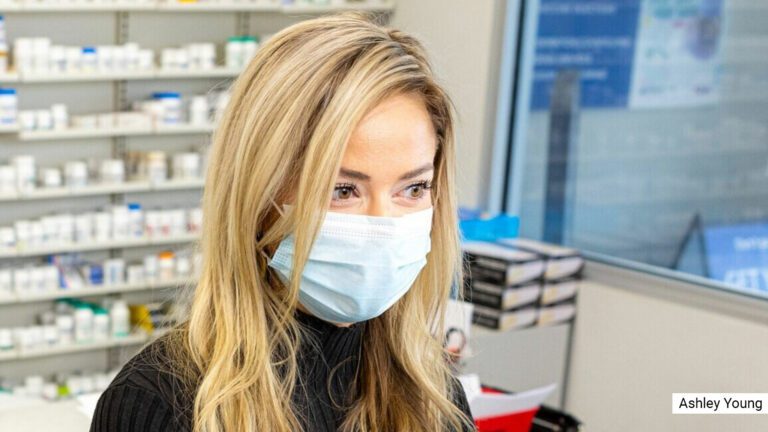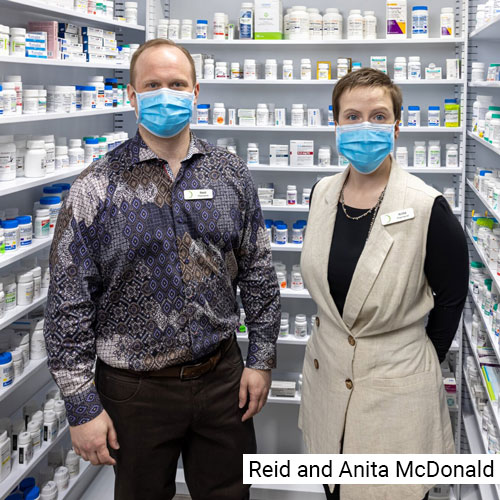
The standards referenced in the article below are out of date as of February 1, 2025. Please refer to ACP’s new standards for up-to-date information.
After the number of active COVID-19 cases reached its first-wave peak in late April and early May, the number of active cases in Alberta dropped during the summer months of 2020. Still, many Albertans wanted to be sure they had not contracted the coronavirus without realizing it, so demand for asymptomatic testing surged.
In response, Alberta Health introduced asymptomatic COVID-19 testing in community pharmacies, starting with a pilot program in July that was limited to 20 pharmacies.
The Sandstone Pharmacy in Airdrie was included in the pilot. Licensee Ashley Young was confident her pharmacy was ready.
“We had processes in place for injections and point-of-care tests, we completed education on the COVID-19 swab tests, we were already using personal protective equipment (PPE) for injections, and we had a good process in place for cleaning,” said Ashley. “We could modify if needed but it was really just small tweaks to the processes we already had in place. We were ready.”
The pharmacy implemented a new software program to book patient appointments for a throat swab. Upon arriving at the pharmacy, patients were screened and referred to an AHS symptomatic testing facility if they had any COVID-19 symptoms. Those without symptoms were given a throat swab at the pharmacy, with the sample sent to a lab for analysis. In all, Ashley and her team performed nearly 800 tests.
“It was a great convenience for patients,” said Ashley. “Some patients were concerned about potentially exposing themselves to the virus by coming in for a test, but that was an opportunity to educate them about the virus. The community really turned to us as leaders to provide care and education.”
 Once the program was expanded to all Alberta pharmacies in August, Cochrane’s Reid and Anita McDonald jumped on the opportunity. As soon as his Sunset Ridge Pharmacy was confirmed as an asymptomatic testing site, their team did a trial run by screening and testing all staff members who wanted to be swabbed. When the initial rush for asymptomatic testing occurred, the pharmacy was ready thanks in part to ACP’s Laboratory and Point-of-Care Testing Standards, which had come into effect in 2019.
Once the program was expanded to all Alberta pharmacies in August, Cochrane’s Reid and Anita McDonald jumped on the opportunity. As soon as his Sunset Ridge Pharmacy was confirmed as an asymptomatic testing site, their team did a trial run by screening and testing all staff members who wanted to be swabbed. When the initial rush for asymptomatic testing occurred, the pharmacy was ready thanks in part to ACP’s Laboratory and Point-of-Care Testing Standards, which had come into effect in 2019.
“The standards allowed us to jump in right away,” said Reid, Co-owner and Licensee at Sunset Ridge. “We reviewed the Alberta Health requirements and confirmed that we were able to meet what we were being asked to do immediately. Thanks to the standards, we had processes already in place that everyone was aware of. We could react quickly and provide the service almost immediately.”
Sunset Ridge performed approximately 550 tests. Pharmacy co-owner Anita McDonald believes her community benefitted greatly from the program.
“We had quite a few teachers book tests with us before school started,” said Anita. “A number of them came back on a regular basis for tests for their own peace of mind as they had some high-risk students in their classroom. Other patients liked that the tests took place in a comfortable environment with people they knew.”
As of October 20, 2020, approximately 659,000 asymptomatic tests were performed in Alberta before the program was paused, with a positivity rate of 0.11 per cent. Anita believes the program was a win for Albertans and for pharmacy.
“We proved we could do something on that scale,” said Anita. “Pharmacy can play a bigger role in public health. If we can show that we can do something like this on a large scale in a professional manner, I can see our profession growing to do more things like this. It helped Albertans realize that we are here for them in many different respects.”
According to Reid, he and his colleagues at Sunset Ridge had many key takeaways from the experience that will benefit their practice long term.
“Asymptomatic testing was one of the first experiences we had with managing overwhelming public demand for clinical pharmacist services,” he said “We learned how to rely on all team members—both pharmacists and pharmacy technicians—to ensure all the steps in the process were completed, including pre-screening, sample collection, sample storage and drop-off, and following up with the patient with results. We also documented everything to ensure safe and efficient collection. The processes developed are transferrable to future pharmacy practice as public demand for clinical pharmacy services continues to grow.”
Ashley believes the success of the program further highlighted the accessibility of pharmacists as reliable sources of health information.
“In times of crisis, or otherwise, pharmacists need to continue to be leveraged by the public health system as a resource for patients,” she said. “The last thing we need in a crisis is for primary care clinics and urgent or emergency care resources to be consumed with patients due to poor navigation or understanding of the resources available to them. For a lot of Albertans, coming to their community pharmacy is a lot easier to navigate than the public health system. Pharmacists can be further used for screening programs, enhanced provision of publicly funded vaccines, and ongoing chronic disease management.”




